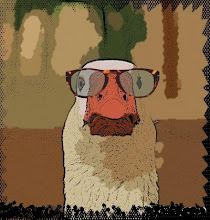(Or several, or even a thicket),
In hopes I may win
A billion bucks in
The unlikely case that they pick it.
The money on tickets I spent
Undoubtedly wastefully went,
As the odds it's apropos
Work out to point oh-oh-
Oh oh-oh-oh three-four percent.
The lotteries have their detractors,
Who point out, among other factors:
They regressively tax
The shirts from the backs
Of poor and irrational actors.
But what should one say in regards
To those who've considered the odds?
The learned and lettered
Who ought to know better
But still end up wagering wads?
We're not quite as dumb as we seem
To fall for the lottery scheme;
Though remote is the chance,
There's still the romance
That our dollar may buy us a dream.
First of all: happy New Year!
Greetings dear readers, and especially (and apologetically) to those of you who have enquired as to when Dr. Goose would break his long blogging silence. Happy to be back though, things being as they are, I make no promises or predictions as to the length of the next hiatus.
Now to the topic at hand: it has long been accepted that participation in a lottery is economically irrational because the expected payout is so small and remote. However, in the realm of behavioral economics - i.e., the psychology of the economic choices that people make - such participation follows predictable patterns. For example, in economic hard times, lottery sales increase somewhat; not because the jackpot is any likelier, but just because the dream is that much sweeter. Behavioralists would also warn us that we should not really want to win, lest the subsequent let-down rob us of the enjoyment in everyday things.
Of course, you and I have virtually no chance of winning. As disclosed by the Powerball organizers, the odds are just 1 / 292,201,338, or 0.00000034%. We are literally (or statistically) more likely to die in an asteroid strike.
Bottom line: winning is bad, the odds are effectively nil, but the game is cheap and the dream is sweet. So, "play on, America" - I, too, will join the queue of hopefuls.








